Review for Summer Wars
Introduction
I’ve finally done it. I’ve finally got around to watching the last of the anime Blu-rays that I bought with my Blu-ray player. After two and a half years, I’ve at last found the time to take in Summer Wars in high definition. Of course the to-watch pile has grown a little since then, but that first batch of Blu-rays that I bought, done and dusted; the anime Blu-rays that is, I still have a couple of live action films to get around to. The irony is that it was the Summer Wars DVD that in a large way convinced me to upgrade to high definition. Good though that disc was, the complex and detailed animation within completely defeated the boundaries of the DVD format. Scenes with over a thousand moving elements on screen just degraded the image with compression and motion artefacts to the point where the DVD was just guessing at what the original image was. Summer Wars is most definitely a film for HD, and this time I actually get to see what the film looks like. The story hasn’t changed and neither has my opinion of it, so anything in italics is a cut and paste from the review of the DVD. It’s good timing too, as this month sees the theatrical release of Mamoru Hosoda’s next feature film, Wolf Children, ahead of its home video release this Christmas.
Summer Wars is Mamoru Hosoda’s follow up to the acclaimed The Girl Who Leapt Through Time. That was a film that came and shook a complacent anime industry to its core, combining magical animation, appealing characterisations, and good old fashioned storytelling. It’s a simple enough recipe, but in a medium where catering to niche audiences, and supplying eye-candy often feels more expedient, it’s good to have a reminder just how good anime can be. The Girl Who Leapt Through Time was a look at young love, and missed opportunities. Summer Wars looks at family and how people communicate.
This being the 21st Century, most of the communicating is done online, through social networking. In Summer Wars, the world’s most popular social networking site is OZ, a virtual world where it is practically possible to live your entire life. The entire world is connected, businesses, governments, authorities, shops, everything. You can do your shopping online, file your tax returns online, your doctor can monitor your health online, and of course the biggest draw is communication. When electronic translators allow you to interact with anyone, anywhere, the world truly is your oyster. You can play, have fun, fall in love, compete in virtual tournaments, all you have to do is pick an avatar and get started. Of course such a site needs security, and two giant guardians, John and Yoko, as well as a complex algorithmic security code protecting OZ.
The real world still has its responsibilities though, especially for Natsuki Shinohara, who is going back to a family reunion to celebrate her grandmother’s birthday. She’s offering a summer job to one willing candidate to go with her and help out at the party. For maths whiz Kenji Koiso, that seems a better prospect that spending the summer on the lowest rung of system support in OZ, especially as Natsuki is the most popular girl in school. It’s only five seconds before he meets Natsuki’s grandmother, Sakae Jinnouchi, that Natsuki tells him that he’s to pretend to be her fiancé. So now he has to pretend in front of the entire Jinnouchi clan, and things get pretty overwhelming. But that’s nothing compared to what happens later that night, when he gets an e-mail from an unknown sender, a stream of digits and a challenge to break the code. The maths genius is tantalised, only the next morning he wakes up to find that OZ has been hacked, his virtual identity stolen, and he’s a wanted man. There’s an AI loose in OZ now, and it wants to take over the world, both the virtual and the real.
Picture
Summer Wars gets a 1.78:1 widescreen transfer at 1080p resolution. The image is clear and sharp throughout, with consistently strong colours. The character designs are pleasant and memorable, simplistic to look at, but allowing for highly detailed animation, while backgrounds are detailed and lush. The real world looks even warmer and inviting on the Blu-ray than on the DVD. It’s when it comes to the virtual world of OZ that you begin to see the whole point of watching the film in high definition. OZ is a vibrant, rich, fluid world, full of motion and complexity, and in some scenes that can mean a digital image with some 10,000 to 100,000 individual moving elements. On the DVD that meant compression artefacts, mosquito noise, loss of detail, and at its worst, it meant picture break up and pixellation.
You have none of that on the Blu-ray. You have a pretty accurate recreation of the source image, which means fluid, clear and well-defined motion, with no picture break up, and excellent clarity. For the first time I really got to see what the world of OZ was meant to be like, and it is a fantastic other-worldly creation. It’s almost a perfect transfer, as both compression and digital banding is absent. However in a couple of scenes I did spy a little aliasing on character line art. Regardless of that Summer Wars finds its natural medium on Blu-ray.
Sound
The choice here is between Dolby TrueHD 5.1 Surround English and Japanese, with optional translated subtitles and a signs only track, and unlike the DVD you can access these options on the fly with your remote. The sound also gets a boost up from the DVD, richer and well defined. The surround is simple and straightforward in the real world, while OZ gets a little inventive with its sound design. The dialogue is clear throughout in both languages, while the music suits the film well, humorous and whimsical when appropriate, dramatic and strident when the situation demands. With the Jinnouchi family numbering in their dozens, it all gets a little chaotic when it comes to voice performances, but the Japanese voice cast was up to the challenge. I only sampled the English dub, but it also seemed like a top-notch effort from Funimation. I have to say that the subtitle font is a little thin and ill-defined, prone to being lost against complex background imagery.
Extras
Summer Wars is presented in a Blu-ray sized Amaray case with a very nice reversible sleeve. One other reason why I wanted to upgrade the DVD was because of the opening credit sequence, which on the DVD was the original Japanese. It did however have an English translation of the Japanese text underneath, but in a teeny tiny font that just didn’t resolve at DVD resolutions. I really wanted to see that in HD. I can’t, because for this Blu-ray, Funimation replaced the credit sequence with their own, plain white on black text credit reel, and they did the same with the end credits, eliminating 90% of the Japanese cast and crew, and replacing them with the English ADR crew instead. Frankly, the original creators of the Japanese film matter more to me.
On the disc you will find a rather nice Interview with the Director at Locarno. This featurette last 13 minutes, and Mamoru Hosoda talks about the response to the film from international audiences, the differences between Summer Wars and The Girl Who Leapt Through Time, and more.
The Cast Interviews collect conversations with Ryunosuke Kamiki (Kenji Koiso), Nanami Sakuraba (Natsuki Shinohara), Miki Tanimura (Kazuma Ikezawa), Ayumu Saito (Wabisuke Jinnouchi), and Sumiko Fuji (Sakae Jinnouchi), as they talk about the film and the recording process.
There are 22 minutes in total, with each interview presented separately on the disc.
Finally the disc rounds off with the TV Spots, Teaser and Theatrical Trailers for Summer Wars.
What is absent on this disc, and probably a reason not to throw that DVD away, is the Stage Greeting Event. You will find HD trailers for Evangelion 1.11, and The Girl Who Leapt Through Time.
Conclusion
Summer Wars is magnificent. With the second film of his to be released in the UK, Mamoru Hosoda shows that he’s no one trick pony, with a story that is markedly different in tone and content than The Girl Who Leapt Through Time, but still retains the core values of appealing characterisations, attention to detail, and good old-fashioned storytelling. It’s the ability to spin a good yarn that makes films special, that makes them memorable, and that generates superlatives like timeless and classic. Mamoru Hosoda is a master of this art, as Summer Wars is a compelling watch from beginning to end, by turns comedic, dramatic, emotional and thrilling. Most important of all, Summer Wars is just great, solid entertainment.
It may be misplaced to use the timeless classic accolade for this film though, as its subject matter is very much a now thing. This is a film for the Facebook generation, for whom social networking online is as natural as breathing. The rate at which technology and culture evolves, it may all be completely passé in ten years. After all, most movies about virtual reality as imagined in the nineties would probably be met by snorts of derision today. Where Summer Wars looks to transcend that mayfly significance is that it is a story about a culture clash, with the war being fought on one level between the new way of doing things, the impersonal social network, and the old, the personal, face-to-face human contact and communication. There’s no better exemplar of such communication as the extended family, which is where the Jinnouchi clan comes in, with an elderly matriarch at the head of a close family of 30 or so, an extended family of several more. They have a heritage and history reaching back to the Samurai era, and links and influence in almost every level of modern Japan. Summer Wars also stops itself being dated by creating its own social network in OZ, with its own technology and capabilities, rather than presenting us with something too familiar.
It wouldn’t be much of an adventure story without a little romance, which is where Kenji Koiso comes in. He’s the typical, unprepossessing, teenage boy, lacking in confidence and social skills, with only a talent for maths and an ability with computers to set him apart. He’s all set for a summer of systems support, but being offered a summer job by Natsuki Shinohara, the prettiest girl in school changes all that. If that isn’t enough, it turns out that the job is to pretend to be her fiancé in front of her family. Regardless of the deception, Natsuki’s grandmother sees that the two are well suited to each other, and as the story develops, so does their friendship.
Of course it’s not simply a battle of old versus new, as you can’t really compete with modern technology without using it yourself. It’s also an interesting depiction of the Jinnouchi clan in the way that they resemble a social network in microcosm. Everyone’s doing his or her own thing most of the time, and there’s bound to be one, loudmouth troll in the family. When trouble does strike, there are those who step up to deal with it, those who support from the sidelines, and those who ignore it completely, too wrapped up in their own interests, or hoping against hope that it will sort itself out. Then of course there is the black sheep of every family, in this case Wabisuke Jinnouchi, adopted son who followed his own path, and wound up alienating everyone else. Just like every black sheep, there’s always someone who sees past that, and Wabisuke is Natsuki’s favourite uncle. It also looks as if he may have some responsibility over what begins to happen in OZ. Of course, given that family structures have been around a whole lot longer than social networks, it may be more appropriate to liken social networks to families but in macrocosm. The important thing is that when the chips are down, trouble looms, and when someone can push everyone in the same direction, then families come together and stand as one against adversity. The outcome of the story hinges on whether the analogy to social networks does indeed stretch that far.
Summer Wars has been described as Ghost in the Shell for the Facebook generation. But for me, it’s more akin to an updating of one of my favourite movies, Wargames. Gone is the Cold War setting, and gone is the archaic view of computers and computer hackers, but the story still follows a similar path. There’s a socially inept teenager that blunders into the wrong corner of the Internet, and puts Armageddon into motion, for which he is duly blamed. It turns out that he’s the only one who can put things to rights, and it becomes a race against time to save the world. Fortunately he has the help of a pretty girl. The difference is that in Summer Wars, she’s brought her whole family along to help as well. And that is in the end where Summer Wars differs, with the focus on family, on how they interact and relate to each other, and how family bonds are strong enough to stand against hardship. Summer Wars’ message is certainly timely, that social networks aren’t just confined to the digital and virtual realm, and that if we neglect our social networks in the real world, there’s not really much point in bothering with them in the virtual.
I found Summer Wars to be almost as enthralling as Hosoda’s earlier The Girl Who Leapt Through Time. Summer Wars lacks that raw emotional draw that a simple love story will always have, its subject matter by its very nature appeals to a more limited audience. The story does transcend that though, it’s thoroughly entertaining and rewarding from beginning to end, never once becoming weighed down by technobabble. For me, the difficulty comes in character overload. The Jinnouchi clan is big, and keeping track of thirty people and how they relate to each other is nigh on impossible. Of course the whole point may be to be just as overwhelmed at it as Kenji is, and naturally the rewards will come in re-watching the film. So in comparison to The Girl Who Leapt Through Time, Summer Wars comes off as second best. It’s still a phenomenally good film though.
It’s even better on Blu-ray, where you get to see all the fantastic creation of OZ in phenomenal clarity and detail. Watching it again last night, I was struck how, despite all the technical aspects of the story and the sci-fi trappings, at its heart it’s still a simple tale about love, and about family. The premise seems esoteric at first, but it’s really good, old-fashioned storytelling, the kind that affects you emotionally first, intellectually second. You can buy Summer Wars on Blu-ray individually or as part of a Twin Pack with The Girl Who Leapt Through Time.
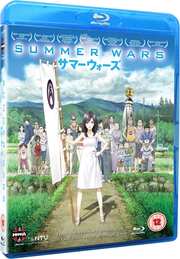
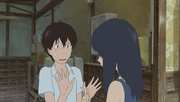

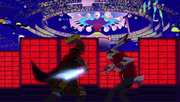



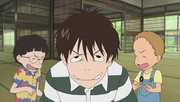
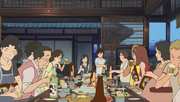




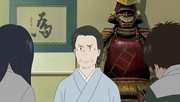




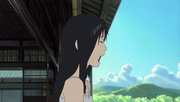

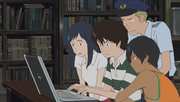
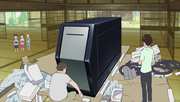


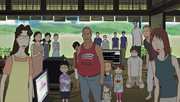


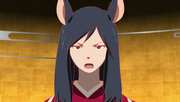


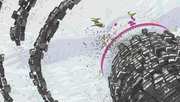















































Your Opinions and Comments
Be the first to post a comment!